With heavy eyes I laze in the lindens, brain fizzling with gin and tarragon and the dull twin gravities of time and humid heat. A shifty geriatric mumbles “You’re a Grand Old Flag” in a squalid plaza, legs crossed, espresso droplets on his flaccid, aging, neatly-shaven legs. A ferry crawls across a stinking river; a wild dog has accidentally eaten hashish and looks to be half-dead beneath the rhododendron — and the flag dribbles along the humid pole, at perpetual half-mast. Flotsam from another storm sprawls dry in the gutter, and filthy men are smoking cigarettes with diesel-stained fingers, cackling smuttily about the Governor in her summer swimsuit. I am drinking too much beer, nibbling salami and ham — gobbling them lustfully by evening, not for pleasure or for sustenance but as a flagging weed photosynthesizes. My meals and snacks and the quaffing of so much cerveza is altogether dumb, vacuous — a mammalian urge to remind myself that I am still alive. I am, I presume, staving off the dramas of another harrowing and long-awaited departure.
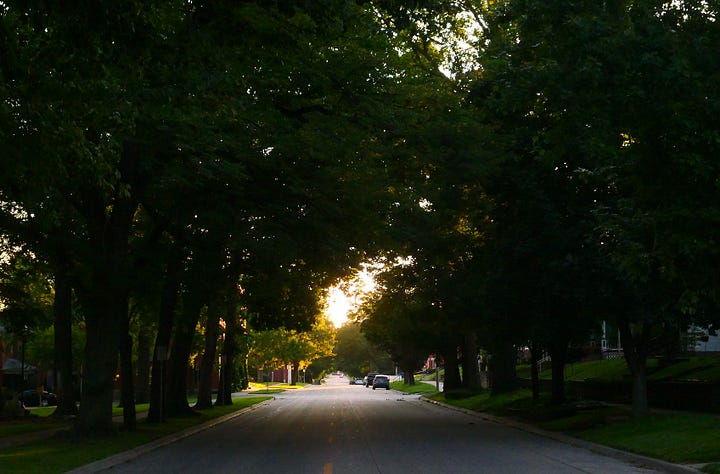
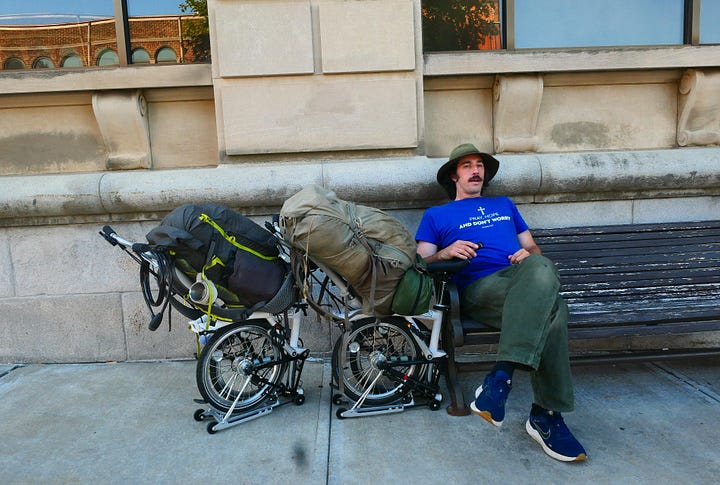
But I rise to find that I was only dreaming — only caught in the eddies of sweating, vernal half-sleep, dreaming the dreams of summer’s troubled creatures, disturbed by the tossing and turning August nights. No rivers, no squalid plazas, no Governors or dogs baked mindless on hashish — I found myself, in actual fact, in Iowa, and I rose to taste the morning with the red and drooping eyes of ancient buzzards, shuffling down a set of stairs I have never seen before.
And I found myself slipping out into the cool fresh air, already melting downward in conversational repose upon a creaking lawn chair, like an Iowan Buddha, though the morning was still so young. A smiling, wispy maiden places a metal mug of coffee into my hands, wordless, moving soundlessly across the porch’s grey-brown planks like an apparition in a long dress. The baritone notes of my own voice rattle the flesh upon my chest, vibrating my brain awake — I am speaking brainlessly and without thought, well before coffee has taken effect, remarking on the holy fevers of heart that one finds on meandering roads and corn-crowned bluffs. I declared, half-awake:
“Iowa is not merely land but a cartographic representation of the stream-of-consciousness at the center of the minds of all men. Her tableaus freeze upon the eye like langourous still-lifes; she is a caricature of joy so immaculate that she cannot be lying — Iowa is proof that contentment radiates from the good things of God and His sleeping, feminine, blossoming landscapes..”
The bearded man before me seems to look as if John the Baptist were his own father — his beard’s immense volume flutters in morning’s chilly breeze. Wool presses against my flesh as I cross my arms in the style of elderly and professorial men, yammering blindly. Observing the ancient oaks and impossibly clean white dirt roads; I watch his eyes move as I bluster and speak like a madman. He is delighted and he is wise; he is statuelike and he is formless all at once — he is a man, and I am a guest in his house.
His children all smile, quiet, placidly hoping to play with a new friend but rapt with fascination at the morning’s discourse. My coffee cup — now empty — has disappeared, replaced by a juice glass — which I empty quickly — and this glass is replaced again by a large smoothie. Though it is my habit to say “thank you” at such pleasant happenings, the girl serving me moves so quietly I do not notice her — and the conversation is already rising to a friendly volume that conceals any audible trace of her weightless steps across the porch.
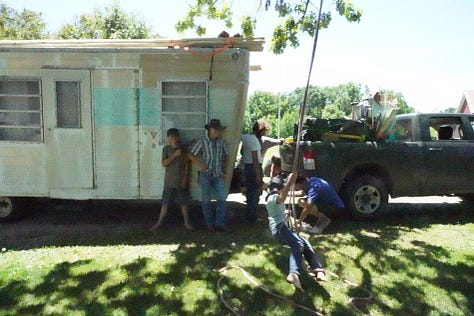
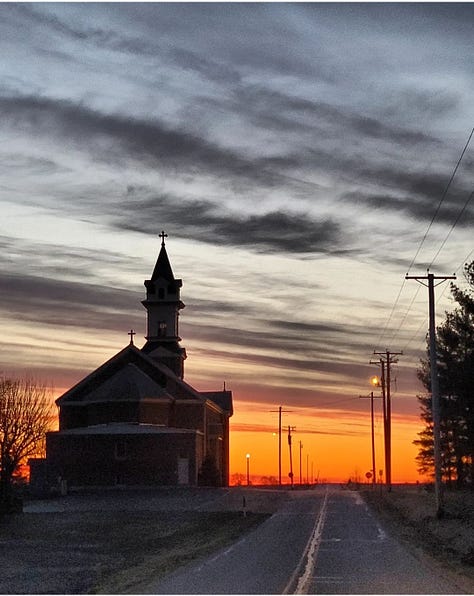

It is as if these people know me already: Coffee first, then a thin and fruity spot of sugar, and finally a hearty glass of thick cream and more fruit — as if they know I must be weaned from the vaporous meal of sleep and taught the ways of solid food anew with every dawn. And after the smoothie — eggs and cream and corn tortillas, chilies and sauces, all taken between edifying soliloquies and stolidly-delivered scripture and delightful wisecracks — and wry, winking nuggets of the wisdom whose source lay well beyond men and Man. I am a guest in this house, and this is a house of fervently religious people — but they are the sort of religious people who smile rather than wince at the things of this life.
My wife is next to me now, her fingers already exploding with the dazzling fury of a woman who prefers to keep busy. She threads warp and weft with her German silver shuttle, ‘tatting’ lace crosses and doilies and hearts as she listens to I and the chuckling, wizened patriarch discourse and ramble. Soon the children are seated as well, all of us in a circle, and the man’s wife appears barefoot in a long dress — eyes twinkling at the rich intellectual life of her husband whenever he speaks. Beyond us, goats are bleating and peacocks furtively dart across the hardpan; acorns fly across the lawn in a rhythmless spray — Iowa talks and waltzes, lulling us all into a state of holy friendship.

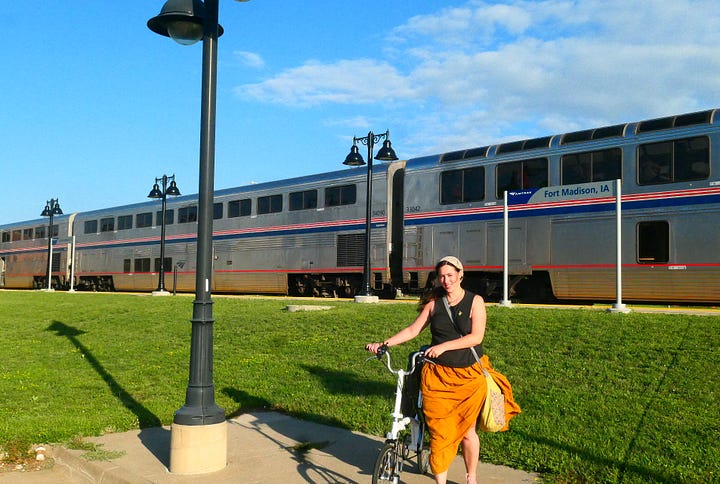
And as I sat and talked the hours away, wandering across the noon hour and well into the summits of high afternoon, the weft and warp of the good Iowan vapors crowned me with a vision so great I could not ignore it. Friendship — that holy crop whose seed may bear blossoms the instant it is planted; the angelic flower of hope in the domain of men’s hearts, the leavener of dark compaction of spirit — the untier of knots in the minds of despondent men. Friendship was here, and it was now healing me.
How often have I lost those whom I thought of as friends? How gravely did these losses sting and bruise me? Men and women for whom I might’ve twisted my own veins and bore impossible burdens; human souls whose elegant topographies I’d overlayed with my own as truly and permanently as tattoos — gone. Dimly bobbling into the arena of my own arrogance, I swung the arms of my friends into the deadening world of conflict or indifference — or found myself so swung by their own hands.
“Do not contact me ever again,” one said to me on a telephone call when Roe V. Wade was mercifully overturned. “I find your views disgusting and reprehensible,” were the words — and like that, many years of friendship were buried. And yet I had not signed the document, nor had she: I had no volition in these matters at all, and neither did she — but where I smiled, she wept, and as such, a friendship had to die for reasons that remain entirely abstract. And just as easily I have done to others as she did to me — fleeing from old compadres over trifling and worldly matters far from my or their control in a flourish of tense-hearted brokenness. Such things issue from the regrettable and human choice of convenience, ideological purity, or dogma and schism over nourishment and love.
For friendship is the sustenance that feeds the hearts of men: Even the hermitic ascetics of old Egypt — Saint Anthony the Great being one — came down from the arid mountains of their profound and holy isolation, beckoning the others near to them as friends, proclaiming by experience that it is not good for man to be alone. Such teachings blossomed across the earth as trees bearing impossible manna for all mankind. It sprouted fraternal bonds among monastics and Priests, and among laymen, friendships so incredibly central to the life of the heart that they would be treated as an organ of the bodies of both souls “until death do us part” — as with marriage.
But unlike marriage, discernment of friendship demands no dizzying production or courtship, at least not in all cases. Sometimes, it is as simple as opening the door and pointing to the guestroom — or it is as delightfully easy as rising from the guestroom into the morning to gulp nectar in Iowa’s laughing breeze, where conversation and mirth’s holy music play the hymns of an unexpected wedding feast.
Blessedly, our stay at one Iowan country home brought such a feast — for I felt myself smiling so often and so fervently that my cheeks hurt by the end of each day. I was making friends as easily as I’d ever lost them before — and in this case, I befriended not only the man of the house and his wife, but their seven children as well. For if the Iowan householder disappeared on a moment’s errand, his children rose to fill the void, raising discussions of their futures or of books they’ve read, or bringing me radio-controlled cars and toys to inspect. Each time I looked at any one of them, even absentmindedly as they passed through the halls, they beamed, smiling as if I were their own uncle. And perhaps as I saw them do such a gladdening thing some breath of their own innocence as children was breathed into my heart. In this world, even the mildest wisp of innocence or joy comes as an urgent medicine — and these children administered it expertly.
The visit ended all too soon, for we had a train to catch, and its schedule forced me to look at the clock warily. With no desire to leave whatsoever — for I had made true friends who already felt to me to be family — I pried myself away from the porch, packing our things into their son’s van to depart. Pulling away, I was nearly misty-eyed, watching as the family all stood together and waved. And I said to myself: “This won’t be the last time I’ll be seeing these wonderful people.”
But today — the hangover came over me. The grim realization of the great rarity of these gifts socked me in the stomach; the sorrowful recognition that there are today many human souls on earth who are starving for such encounters shot me darkly for its profound misery. That I could be blessed with even one friend struck me as a minor miracle, much less several friends — but what of those for whom the impenetrable fog of loneliness is a hallmark element of daily life? What of those who taste friendship only casually — those for whom the word is imbued chiefly with temporal convenience and impermanence? What of those whose friends are, in so many words, “here today and gone tomorrow?”
Without question, we must rise to the challenge of feeding the starving. And while the bureaucratic machinery of charity provides some semblance of a starting point for our fulfillment of this task, it must be forever remembered and emphasized that ‘man lives not by bread alone.’ To be ladled with broth and vouchers and loose change is to stay alive; it is often enough to evade the grim threat of bodily death. But such things cannot feed the starving. The starving are often obese — they are often dying from ‘too much’. They are often wealthy, powerful, or at least comfortable and not without some agency over their circumstances: but without the spiritual bread of friendship, they are dying. A pittance of bread and of water is all that is needed to keep a man alive; a leaking hovel shelters him from wind and he is not frozen stiff in the chill — but for a man to live, he must know true friendship.
What is this thing? What are its bones and heart? The friend comes easily and offers himself freely — he listens and walks beside his compatriot as if they might have been born of the same ineffable substance. And from the moment of their ‘marriage’ into friendship, each rises beside the other before any trial, wordlessly emphasizing their willingness to lose for the sake of the other. In ghettos, this is called “Ride or Die” friendship — in combat military units, it is the “band of brothers.” It is the stuff of strong families and great nations, of formidable tribes and churches and even of successful criminal gangs. Boys crave it and will go anywhere for it — from football teams to thieving gangs and junkie encampments to the United States Marine Corps, any hungry young man finds himself venturing in these directions easily and without any coaxing at all.
Do men need the bravado of the mannerbund to survive? Must they learn salutes and pick up guns or needles or footballs to sustain the heart? Perhaps not. Perhaps, though a few of these ‘mannerbunds’ are built of essentially good stuff — they aren’t remotely necessary. For friendship rises and billows as easily as clouds grow in the high heavens of the atmosphere; it is free, it is easy, it is borne of those who gaze fearlessly at the world of hurt that other human beings can cause — bravely smiling and motioning a stranger into the house and toward the guestroom, even if their arrival could bring ill. The friend lives in a world of resonance and song; where none exists, he provides it without accounting or receipts or the biting of his nails. He does not niggle or count, he does not expect — he only listens to the notes of the other’s heart and tunes his singing voice to ring out with that of his partner.
It should be no wonder to anyone that the rise of suicide and drug addiction and diseases of mental anguish and despair would be coextensive with the frustration and decline of man’s natural impulse toward friendship. The logic of machines has transmuted itself onto the flesh of modern man; it has indelibly written its world of rules onto the heart. Our era is an era of the anxious analysis of mechanics and diagnosticians — an era of “if X, then Y: and if no X, there can be no Y, forever.” We fly about the highways like couriers for this great machine, filing paperwork and scanning barcodes, operating ourselves as tiny corporations, breathlessly rifling through a world of legalese and disclaimers as we “discover ourselves,” atomized and “free.” The era of “keep it casual” is the lawyer’s favorite era — for the casual man promises nothing and receives nothing in return; he is always free, and he is always starving — and starving men pay.
It is for this reason that true friendship is an obstacle to the world of human resources and commerce. True friends abide not in what is postulated by the State or demanded by the shift manager; true friends are “dead to the world” as they knit themselves together in the innermost grottoes of mind and spirit. They are not distracted by the ephemeralities which are now sold at deep discounts at big sales and ghastly buffets — they are too deeply occupied with the fine and utterly human instinct to fulfill one another in a state of deep and edifying rest.
Let us rise into our Iowan mornings or desert dusks, let us waltz across the cobblestone streets of yawning cities, out into the daylight of love, roused from the dreamless anti-sleep of halfheartedness. Let us take strangers into our homes and kitchens and porches and cars; feed them and love them, no matter the risk. For ours in an era of starvation — let us be friends together, now, without delay, that we may be truly fed.




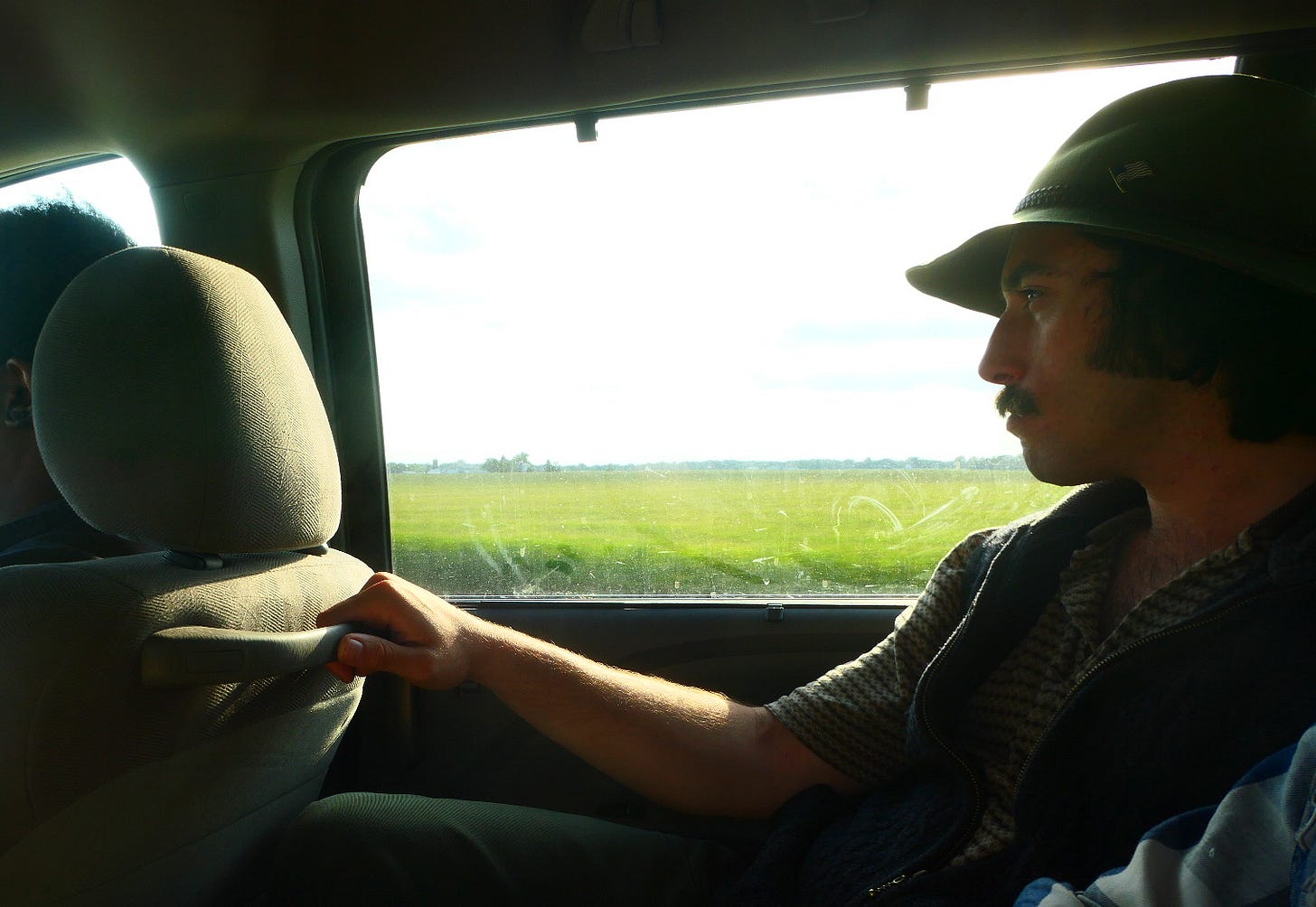
I am a Canadian living in Toronto, and I am quite removed from the things you write about. I regularly clean out my inbox, deleting things I don't have time for and in some cases piling links into a folder for another day. I want you to know that your updates are always left in my inbox at the end. The entire thing is always purged except one e-mail containing one of your posts, and I try to make time to read it. And if I am ever too busy, and I ever do delete it, it is always with regret, after it has lingered in there for many days like a shim wedged in a door.
This is re the comment that you're too verbose. I think I know what the dude means, but verbose isn't the right word for it. Verbose means you're using more words than is necessary to say what you mean. I don't think that's the case.
I think what the dude is trying to say is that you have way more story to tell than he is willing to listen to.
I've run into that myself. I'm a slow talker so people often want to move on before I'm done with my story. It's people I wouldn't invite to my campfire.
I think that before people sit down to one of your stories, they should light up a cigar and pour themselves a drink and then start reading, take a puff or two, blow out a smoke ring, tap some ashes off the end of the cigar while savoring what they've just read before moving on to read some more.
The man who thinks you're too verbose needs to take a three day train ride like Oakland to Chicago some time, go up to the observation car and listen to someone tell him their life story. Learn some patience.